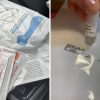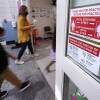As COVID-19 continues to surge, many teachers have not been able to make it back to the classroom to teach in-person. Scrambling to keep schools open, school districts don’t have enough substitute teachers to fill their places.
Lisa Sheehan, a librarian at John D. Hardy Elementary School in Wellesley, said many teachers are out because either they or their children are testing positive for COVID-19.
“I have three kids, so I decided that everybody should test on Sunday. We were shocked to find out that my daughter was positive again,” Sheehan said. “Now my son is sick, and we're waiting for his COVID test, so it's all a little bit crazy.”
Sheehan said she hasn’t been able to go back to school and that she’s lucky to have found a substitute for herself. But with many educators in similar situations, the demand for substitute teachers has been high throughout the pandemic.
“I think it's hard because being a substitute teacher is not an easy thing to do. You've got to really want to do it,” Sheehan said. “I think during this era of COVID, you also have people that are risk averse. They're just simply not willing to come into a school with a potential threat of ‘I might get sick myself.’ We already did not have subs. We didn't have them last year. We don't have them this year. And then this surge of course is just compounding that.”
Chelsea Public Schools superintendent Almi Abeyta said that this shortage isn’t new.
“The pandemic has just exacerbated that situation for at least four Chelsea public schools. We've been recruiting, but it's still very difficult,” Abeyta said. “It's putting a lot of pressure on school districts to provide classroom coverage.”
The school district has been trying to fill in these gaps by hiring retired teachers. Additionally, academic coaches, principals and assistant principals have been helping to teach classes — including Boston Public Schools Superintendent Brenda Cassellius, who stepped in to teach a fourth-grade class on Wednesday.
Abeyta said they’ve been working to recruit substitute teachers all year and that one of their departments is even trying to recruit parents.
“We're doing everything to make sure classes are being covered, and we're making it work,” Abeyta said. “Whether it's support staff, paraprofessionals, substitutes, retired teachers, central office principals, assistant principal, assistant superintendent and in some cases, superintendents covering classrooms, we are working really hard to keep our kids in school. We really want everyone to be safe.”
On Monday, Brockton Public Schools increased its daily wage for substitutes from $95 to $135 to help recruit more substitute teachers. Jess Hodges, a spokesperson for Brockton Public Schools, said the district has had senior administrators teach classes.
Sheehan said it’s disappointing that these issues haven’t changed over the last two years, but that districts are on their own when figuring these things out.
“The districts aren't getting support from the state, and I don't know that the state is getting support from the federal government,” Sheehan said. “I think there's an overall failure of leadership, and I think district level people and admins are doing the best they can. I think teachers are doing the best they can.”








